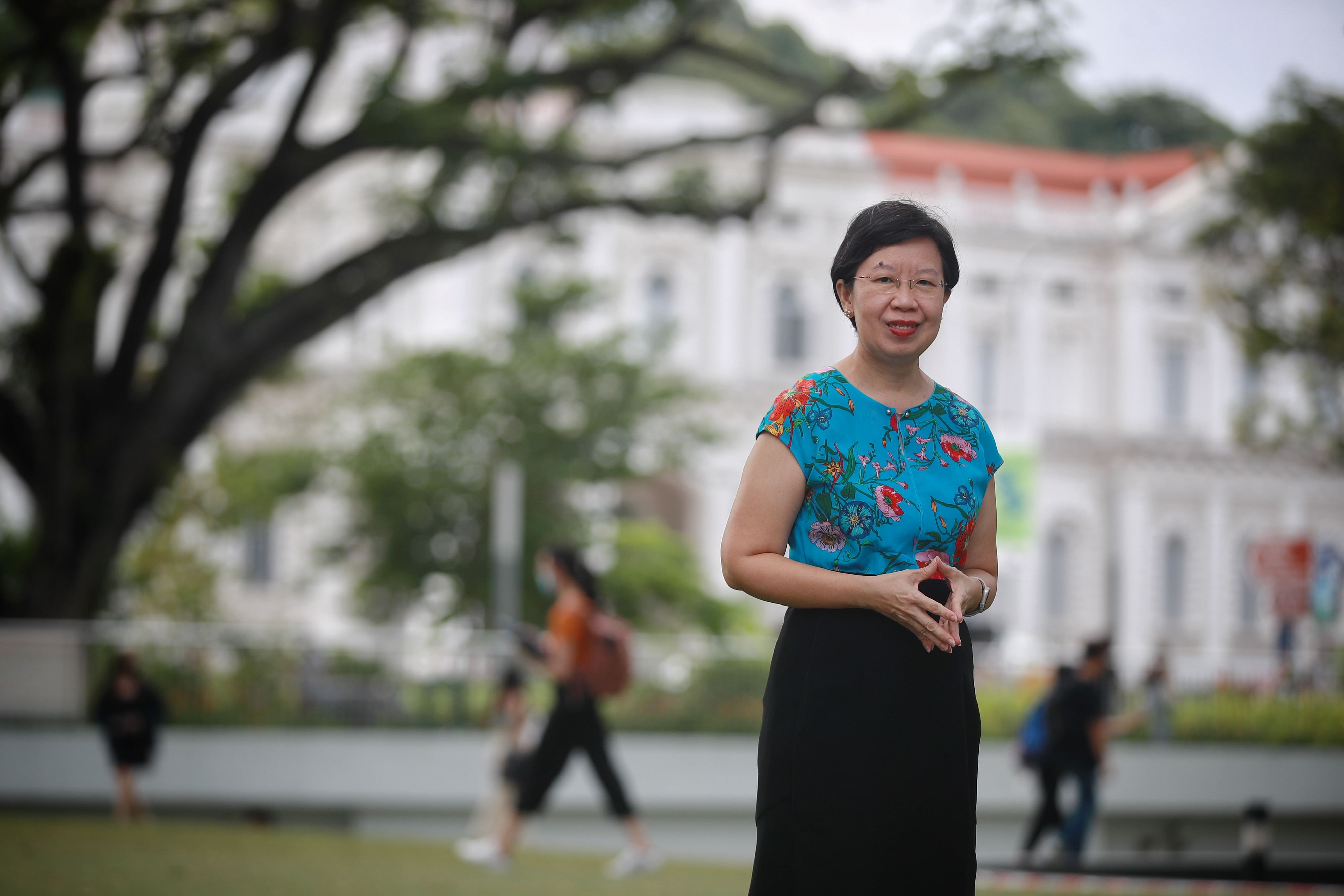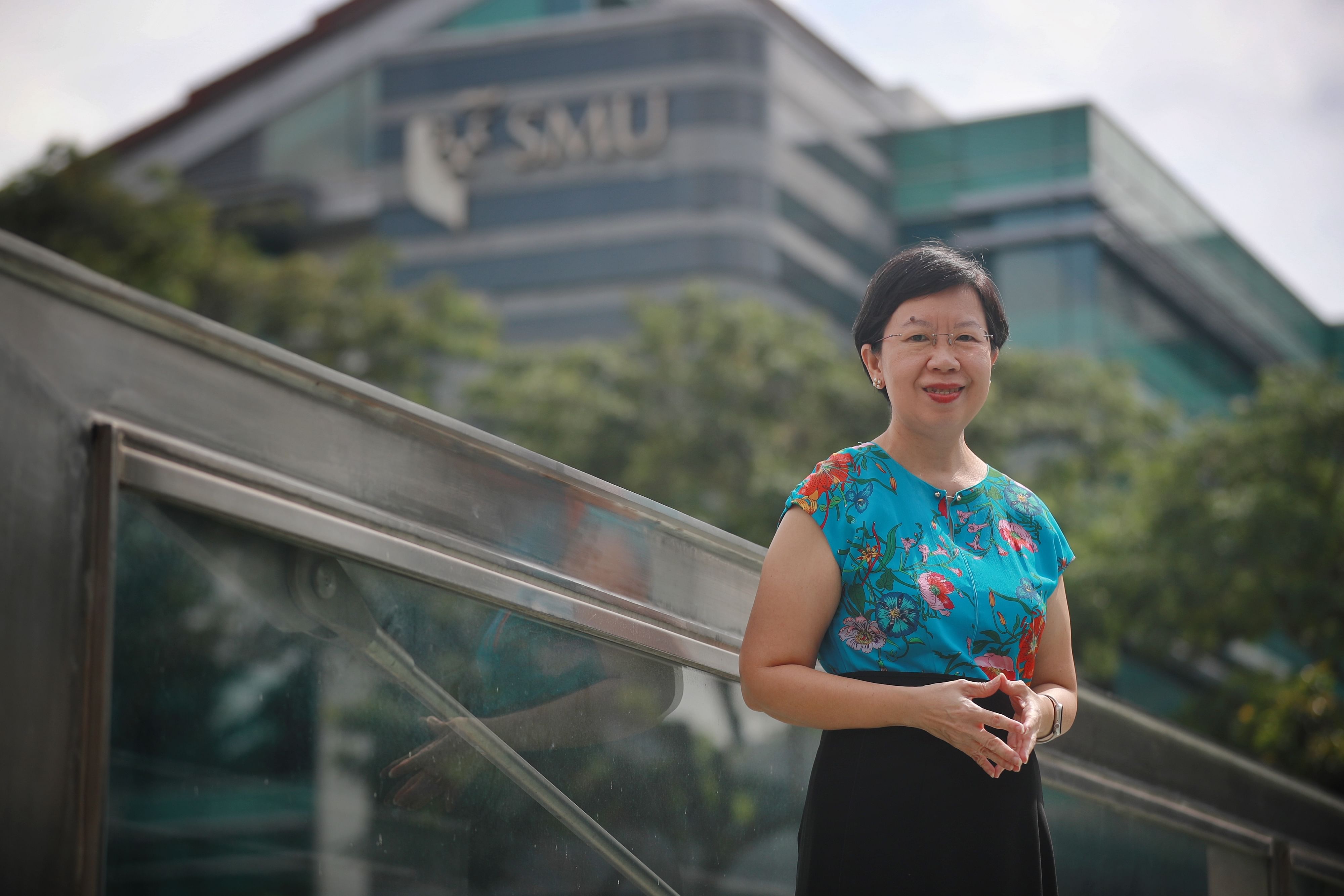The university and the city
In the second of a four-part series on the changing role of universities, SMU president Lily Kong talks to The Straits Times' senior education correspondent Sandra Davie about the special role of city universities
Sign up now: Get tips on how to help your child succeed

SMU president Lily Kong said the university community knows how privileged it is to be given the prime location in the heart of the city.
ST PHOTO: JASON QUAH
SINGAPORE - With a sizeable student population of 12,000, and another 37,000 participating in its professional and continuing education courses, Singapore Management University plays host to thousands daily at its 4.5ha campus in the heart of Singapore's civic district.
A large number of members of the public also criss-cross the campus daily. They may stop for a meal at one of the cafes in the basement concourse, view an art installation at the de Suantio Gallery, use the running track on the campus green or attend events such as the Singapore Night Festival.
In an interview with The Straits Times, SMU president Lily Kong said the university community knows how privileged it is to be given the prime location in the heart of the city.
"For a university that started off as a business university, having the banking and business community on its doorstep was priceless. Over the years, we have leveraged our location and the various communities there, including the business, legal and cultural institutions and groups."
But having the prime location comes with the responsibility of giving back to the city and the SMU community has done this in many ways, she said. These include allowing the use of campus facilities for public events and students taking on community service projects to help disadvantaged groups, such as some homeless people who took shelter in the university's basement concourse.
Integrating the entrance pillars of the old National Library in Stamford Road into the SMU campus was also a way of giving back.
Professor Kong said: "In constructing the SMU Connexion, the university chose to retain the brick pillars and the cast-iron fence of the former National Library building. They are a part of Singapore's history and the collective memory of generations of Singaporeans, for whom the National Library building was a cherished part of their lives."
Apart from the key role of preparing students for jobs in a rapidly changing world, universities also have an important civic role, she said.
"Our responsibility goes beyond preparing graduates for jobs. We can nurture engaged citizens, and cultivate meaningful involvement in the community, be it through community-based participatory research, volunteer work, or initiatives that support social development," she said, before discussing the many other ways in which SMU tries to be a university for the people, not just for its students.
Q: SMU has a rather porous campus, with hundreds, if not thousands of people passing through or using the campus facilities every day. Is that intentional?
A: Yes, pre-Covid-19 there was a constant stream of people using our concourse and campus green, which has a running track that is open to the public.
SMU also lends its venue for many public events, including the art festivals, and the Singapore Night Festival.
We also have seminars, talks and workshops which are well attended. So, in that sense, we are a university in the city, but we also bring the city into the university in many ways.
Q: How have your students and faculty leveraged the campus location in the heart of the city?
A: Our faculty and students have leveraged our urban location for the mutual benefit of university and city.
As I said earlier, in the initial years, it was a boost for our business school faculty and students, who could tap the firms nearby for case studies, work attachments and student projects.
The business community, in turn, has the opportunity to tap the university's vast database of knowledge and intellect, in the form of its teaching faculty, student body, research resources and its offerings of executive education and customised courses.
SMU's Yong Pung How School of Law too has linked up with law firms in the city to provide work attachments for our students.
We bring in top lawyers and judges for talks, and to mentor and interact with our students.
At the same time, the law faculty gives back - our law students, with the help of volunteer lawyers, run a pro bono legal clinic on campus. It helps about 300 people a year who need legal help.
Our other four schools also engage and collaborate with various public and private sectors in the vicinity.
You see it in many cities around the world - the strategic interplay between universities, firms, entrepreneurs, research labs and the diverse communities in the city - and we draw strength from one another in virtuous circles of innovation.
Q: What about the research that SMU has chosen to focus on?
A: Our research is geared very much to solving the challenges faced by Singaporeans and bettering their lives.
Take for example the Centre for Research on Successful Ageing (Rosa) set up in July 2020, which was built on the foundations of its predecessor, the Centre for Research on the Economics of Ageing. Rosa does research on issues related to ageing. Through the centre's work, we are able to examine Government's policies impacting older folk and how tweaking these policies may lead to improved outcomes for older adults in Singapore and ensure their well-being into later life.
In the last two years, we have released important research findings on how the Covid-19 pandemic has impacted older Singaporeans. Through our research, we have found that older Singaporeans are concerned about access to affordable healthcare even as Singapore transitions to a phase where Covid-19 is endemic.
While the pandemic has disrupted the provision of healthcare for older adults who suffer from chronic ailments, the respondents' satisfaction with health remained constant as the shift to working from home enabled some older adults to adopt healthier lifestyles and exercise routines. This brings to attention the point on how we can improve older adult well-being even after the pandemic.

Q: What about a university's role in enabling social and inter-generational mobility, especially since studies around the world have found that inter-generational inequality is increasingly entrenched.
A: It remains very important to us. Higher education is widely viewed as a pathway to social mobility. Studies have shown that most universities successfully "level the playing field" across students with different socio-economic backgrounds, because they provide greater value-add for children from low-income families.
SMU has the Access programme that guarantees eligible students a financial aid package which pays for 100 per cent of their tuition fees, after taking into account all scholarships, bursaries and other grants a student receives.
Unlike most other scholarship programmes, it does not involve an often stressful interview process, and there is no cap on the number of recipients in perpetuity.
SMU Access is also bond-free.
Q: You have talked much about the "social" role of universities, but what about the "economic" role of universities - in particular, preparing students to go on to thrive in this rapidly changing world?
A: Certainly, universities should prepare students to be economic citizens. I am happy to report that SMU continues to do well in preparing its students for jobs.
The university's class of 2020 notched a high job rate despite the disruptions brought on by Covid-19. Close to 94 per cent found jobs within six months of completing their final examinations. Both the mean and median gross monthly salaries were at an all-time high.
Preparing our students for the job market remains an important role for us and all universities. But to prepare young people for the changing world of work, universities have had to go beyond just providing a strong grounding in the disciplines that students choose to study. It is also about developing other skills and attributes, including global competency, adaptability and resilience.
These skills are so important that increasingly, universities around the world, including SMU, have drawn up plans to ensure the development of these skills is explicit and intentional and given priority.SMU has various programmes in place, including overseas experiences, work-study opportunities and SMU-X student projects to nurture these key competencies.
About Lily Kong
Professor Lily Kong is the fifth president of Singapore Management University (SMU) and also Lee Kong Chian Chair Professor of Social Sciences. She was formerly provost at the university.
Before joining SMU, she was a faculty member at the National University of Singapore's (NUS) department of geography for nearly 25 years.
She held various senior management roles at NUS, including vice-provost (education), vice-provost (academic personnel), vice-president (university and global relations), dean of the Faculty of Arts and Social Sciences, dean of the University Scholars Programme, and director of the Asia Research Institute.
An award-winning researcher and teacher, she has received five international fellowship awards including the Commonwealth Fellowship Award and the Fulbright Fellowship Award.
She has also won the Robert Stoddard Award from the Association of American Geographers for her contributions to the study of religion. In 2006, she was conferred the Public Administration Medal (Silver), and the Public Service Star in 2020.
Prof Kong is widely known for her research on urban transformations, and social and cultural change in Asia. In particular, she has published a large body of work on religion, cultural policy and creative economy, urban heritage and conservation, and national identity.
In a Stanford University study of researcher impact among all scientists across all disciplines in 2020, Prof Kong has emerged in the top 1 per cent of her field worldwide.
She is on a dozen editorial boards of international journals in her field and is frequently invited as keynote speaker to conferences in her domain.
She was recognised in Forbes Asia’s Power Businesswomen 2020, and this month was named as one of Forbes 50 women over 50 who are shattering age and gender norms and leading the way throughout the Asia-Pacific region.
She studied at NUS before pursuing her PhD in geography at University College London.


